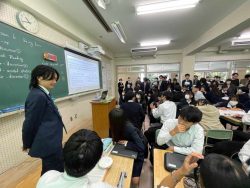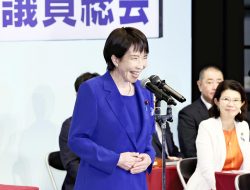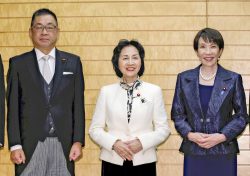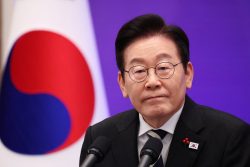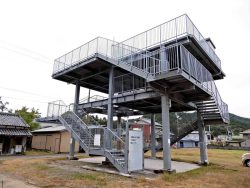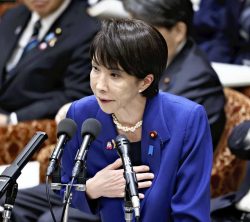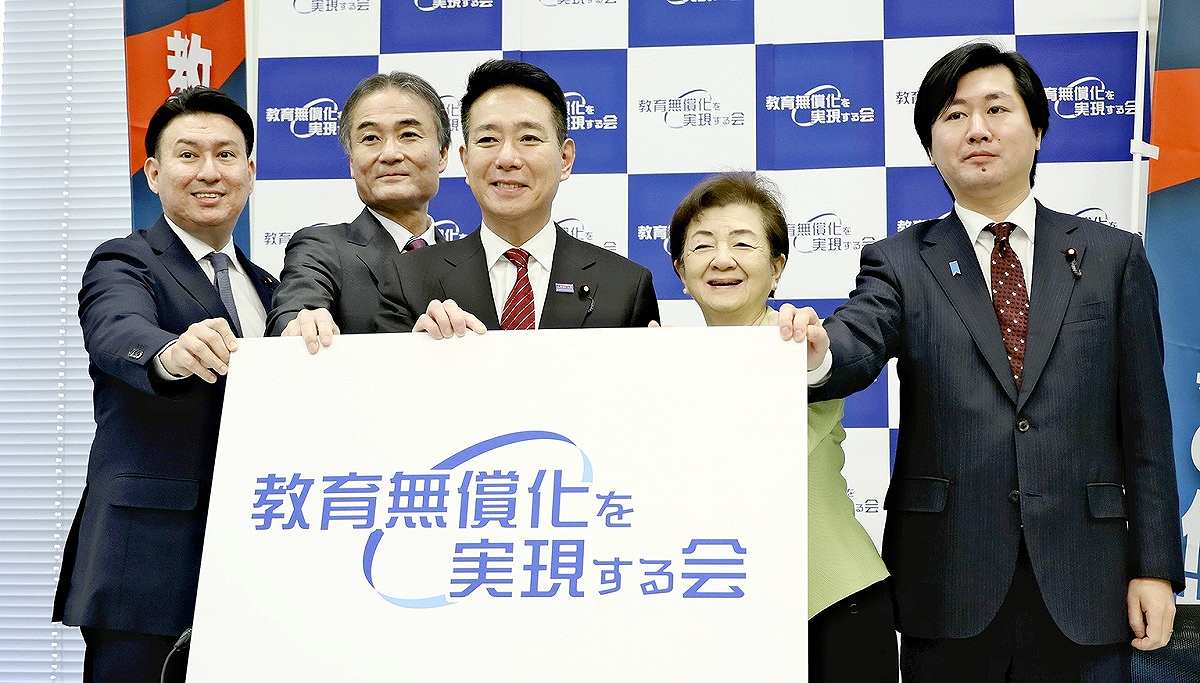
Seiji Maehara, center, at a press conference for the establishment of his new party last December
8:00 JST, January 13, 2024
One of the busiest and most consequential election years in recent memory has begun. On Jan. 13 — today — Taiwan will hold its presidential and legislative elections. South Korea’s National Assembly election is set for April. And the U.S. presidential election will be held in November.
According to the Center for American Progress, a Washington-based think tank, more than 2 billion people across 50 countries could go to the polls this year, which could bring about significant political change and instability. Even though Japan is known for having more elections than other countries, it is surprising that no nationwide elections are scheduled in Japan this year — at least for now.
Does this mean Japanese politics will remain stable and not be swayed by elections? My answer is “No” because there is one election scheduled in the fall that could have a major political impact on Japanese politics: the ruling Liberal Democratic Party’s presidential election. Since Japan has a parliamentary cabinet system, the prime minister is elected from among the members of the Diet. In most cases, the prime minister is the leader of the party with the most seats. Therefore, the election of the leader of the long-ruling LDP can be considered the de facto election of the prime minister.
Incumbent Prime Minister Fumio Kishida is, of course, seeking reelection. However, his current low approval rate puts his reelection bid in serious jeopardy. According to a Yomiuri Shimbun poll conducted in November 2023, the Kishida Cabinet’s approval rate is a paltry 24%. This figure is not only the lowest since Kishida took office in October 2021 but also the first time it has fallen below 30% since the LDP returned to power in December 2012 following three years of government by the now defunct Democratic Party of Japan (DPJ). Even Prime Minister Yoshihide Suga, Kishida’s predecessor, who was unpopular with the public due to his administration’s mishandling of its response to the COVID-19 pandemic, maintained 31% until just before he left office.
Kishida’s current political strategy is simple. He will undoubtedly try to improve his approval rate, then dissolve the House of Representatives for a general election in the hopes of winning another majority for the LDP. In that case, many party members will likely agree to Kishida’s continuation as the president of the party, and he will be able to stay in the top political office.
This will be much harder than it sounds. First, Kishida has no easy or concrete means to improve his approval rate. Second, dissolving the House of Representatives and holding a general election without a higher support rate would likely face significant opposition within the party. Suga also tried the same path in the final days of his administration but gave up due to internal opposition and decided not to seek reelection. Third, the LDP has been hit by a major “politics and money” scandal. No LDP representative would want to face the people’s judgment under such political circumstances. A by-election for a House of Representatives seat coming this April will likely be a tough challenge for the LDP.
Indeed, the current prime minister is surrounded by mounting political risks. Kishida once described himself as “a man who cannot fly,” meaning that he is not the type of politician to engage in political gambling. In my opinion, the most likely scenario is that Kishida will neither be able to dissolve the House of Representatives nor run for the LDP presidency. Rather, the LDP will probably choose a new party leader, and then — while public support for the new leadership is still high — the lower house will be dissolved, and a general election will be held.
Meanwhile, in contrast, there was a shakeup in Japan’s opposition party in preparation for a general election. Seiji Maehara, one of the opposition’s leading figures, who served as president of the DPJ and as foreign minister in its government, established a new party. Maehara’s departure from the Democratic Party for the People was not surprising. But what is his intention in launching a new party rather than joining Nippon Ishin (Japan Innovation Party) as had been expected?
The key to deciphering this move is in the name of Maehara’s new party. It is “Free Education For All” — a policy that Maehara highly values. Maehara lost his father when he was a teenager and received a scholarship for higher education, which he credits with enabling his career in public service. Maehara also explained to me that a free education policy will have multiple effects, such as promoting economic growth and counteracting the declining birthrate.
More importantly, the main liberal-leaning opposition party, the Constitutional Democratic Party of Japan (CDPJ), which includes many former members of the DPJ, and the more conservative opposition party, Nippon Ishin, both support the policy. While these two parties are at odds with each other due to other significant policy differences in other areas, with his new party Maehara might be able to play a mediating role between the two major opposition parties.
In 2017, Maehara attempted to win the general election by teaming up with Tokyo Gov. Yuriko Koike, who led the now-defunct Party of Hope. Not only was this unsuccessful, but it also ended up splitting the Democratic Party, the renamed successor party of the DPJ that he led at that time. Since Maehara’s actions at that time were met with a frosty reception, many in the nation’s political center Nagatacho are cynical about his challenge now.
However, there is a major difference between then and now. This time Maehara does not appear to be attempting to merge the CDPJ and Ishin into one party. What appears to be on his mind is for the opposition parties such as Ishin and the CDPJ to win more seats in total than the LDP and create a coalition government.
This sounds unrealistic for now, but it is not just Maehara’s wild dream. I have learned that at least a few members of the CDPJ and Ishin have held backroom discussions about the idea.
A good reference here can be found in the history of Japanese politics. The LDP has held power in Japan after World War II for an exceptionally long time for any democracy and has been in the opposition only twice since its formation in 1955. Its first loss of power was in 1993 when the Japan New Party and seven other parties came into power by forming a “non-LDP, non-Communist” coalition. The only other time was 15 years ago in 2009, when the DPJ won the election.
Maehara emerged from obscurity when he was first elected to the House of Representatives in 1993 from the Japan New Party. Kishida was also first elected in this election, but in contrast to Maehara, he was a third-generation member of the House of Representatives, following his grandfather and father.
It is important to remember that both times that the LDP surrendered political power to the opposition were when voters’ dissatisfaction with LDP politics reached a crescendo. The public has been especially harsh regarding scandals of “politics and money.” In the past five years, nine LDP lawmakers have been arrested or prosecuted for money scandals. Maehara, who has a reputation for being politically impetuous, must have learned from the past and made a challenging political decision. Unlike Kishida, Maehara is a politician who does not hesitate to take risks.
Kenneth Weinstein, who holds the Japan Chair at the Hudson Institute and was nominated as U.S. ambassador to Japan in the final year of the administration of former President Donald Trump, said: “Given the challenges the LDP faces, this should be the moment for an effective opposition to make real inroads in Japan. Maehara is an impressive policymaker.”
It is quite possible that by the end of 2024, the political landscape will be completely different from what it is today for both the LDP and the opposition.
Political Pulse appears every Saturday.
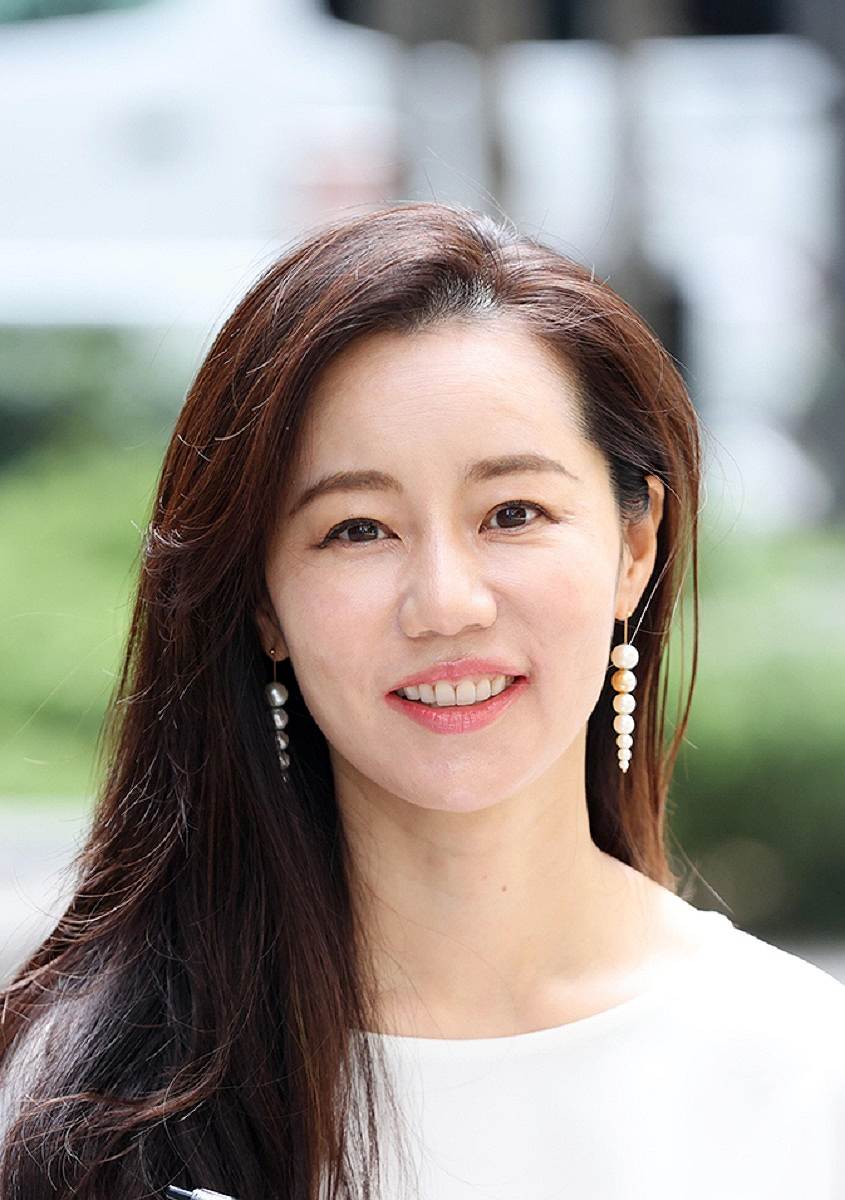
Yuko Mukai
Mukai is a Washington correspondent of The Yomiuri Shimbun.
"Editorial & Columns" POPULAR ARTICLE
-

Violations of Subcontract Law: Major Automakers Must Eliminate Old Practices
-

Local Governments’ Tax Revenues: Devise Ways to Correct Imbalances in Tax Sources
-
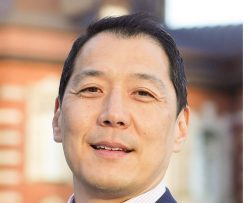
5 Japanese Business Dinner Mistakes to Avoid — and What They Taught Me About Business in Japan
-

Heavy Rains in Asia: Support for Victims, Flood-Control Measures Urgently Needed
-

Rice Coupons: A Misguided Approach to Countering Rising Prices
JN ACCESS RANKING
-

Tokyo Economic Security Forum to Hold Inaugural Meeting Amid Tense Global Environment
-

Keidanren Chairman Yoshinobu Tsutsui Visits Kashiwazaki-Kariwa Nuclear Power Plant; Inspects New Emergency Safety System
-

Imports of Rare Earths from China Facing Delays, May Be Caused by Deterioration of Japan-China Relations
-

University of Tokyo Professor Discusses Japanese Economic Security in Interview Ahead of Forum
-

Japan Pulls out of Vietnam Nuclear Project, Complicating Hanoi’s Power Plans


